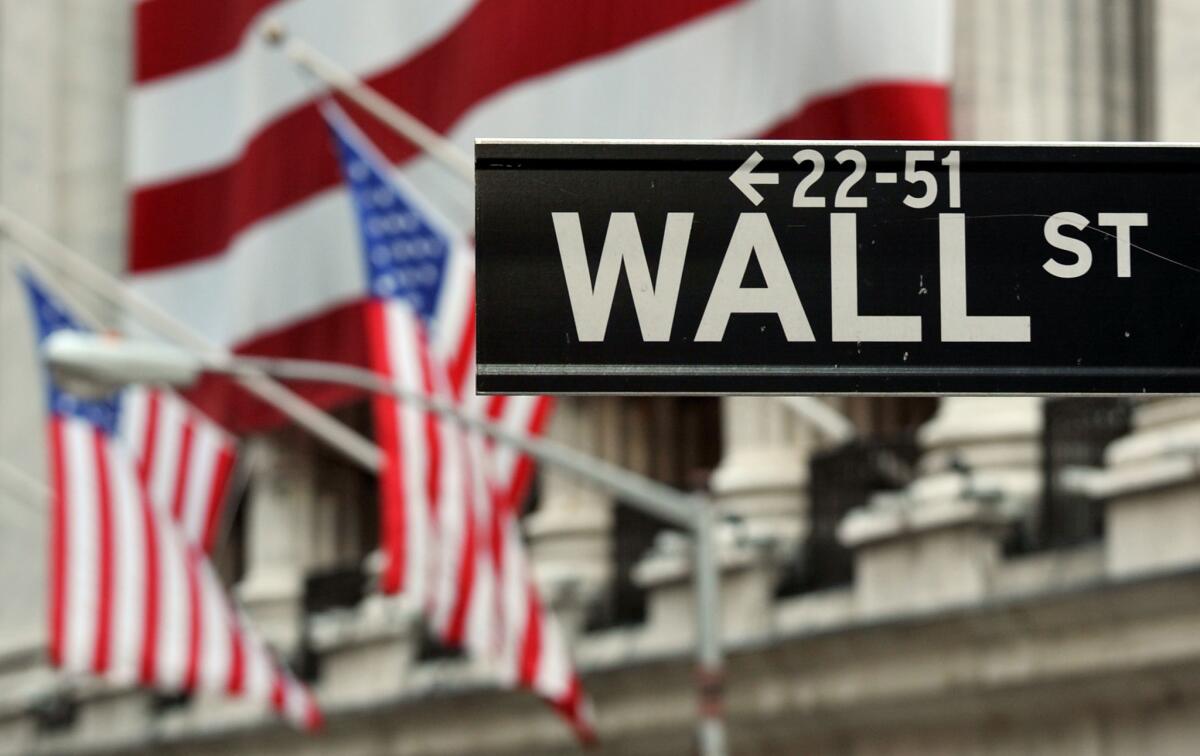Wall Street returns to rallying; gold jumps to record high

- Share via
Wall Street’s rally got back on track Monday, while gold rushed to a record at the start of a week packed with potentially market-moving events.
The S&P 500 rose 0.7% to more than recover all its losses from last week, as Apple and other tech giants returned to their winning ways. Nervousness was still hanging over markets, though, and gold briefly topped $1,940 per ounce for the first time.
The S&P 500 climbed 23.78 points to 3,239.41. The Dow Jones Industrial Average rose 114.88, or 0.4%, to 26,584.77, and the Nasdaq composite gained 173.09, or 1.7%, to 10,536.27.
Investors this week will be closely watching a two-day meeting for the Federal Reserve on interest rates that begins Tuesday. The Fed helped end the market’s sell-off in March, catapulting it into a tremendous rally, after promising to keep interest rates at record lows and to hoover up a wide range of bonds to support the economy. Investors are waiting to hear what the Fed says this week about the economy’s prospects and what it plans to do on interest rates.
This week is also a busy one for corporate earnings, with more than a third of the companies in the S&P 500 scheduled to report how they fared from April through June.
So far, profit reports have been better than Wall Street forecast, though still far weaker than a year earlier because of the recession. Companies that have reported results topping expectations, though, have been getting a smaller bump than usual versus the rest of the market the following day, analysts wrote in a BofA Global Research report.
Several of the market’s most influential companies are scheduled to report this week, including Amazon, Apple, Facebook and Google’s parent company. Those four account for 16% of the S&P 500’s total value, which gives their movements outsize influence on the index.
Such tech-oriented giants have cruised through much of the pandemic on expectations that they can continue to grow regardless of whether the economy is quarantined. But critics say their stocks have bubbled too high, even after accounting for the huge profits they produce.
The tech titans stumbled last week on such concerns, which helped pull the S&P 500 to its first weekly loss in four weeks.
Worries about an uptick in layoffs across the country also hurt stocks last week, as businesses close down again amid rising coronavirus counts across much of the Sun Belt. An extra $600 in weekly unemployment benefits from the U.S. government is set to expire soon, and Congress is still arguing about how to offer more aid for the economy.
The Trump administration’s chief negotiators spent the weekend on Capitol Hill working on a relief bill, though Democrats and Republicans still have much to negotiate.
All the uncertainty about the economy, the pandemic and how long interest rates will remain at nearly zero have helped drive the price of gold higher, making it the best performing investment of 2020. More recently, a weaker U.S. dollar and worries about rising tensions between the United States and China have given gold an extra boost.
Gold for delivery in August added another $33.50 to settle at $1,931.00 per ounce Monday, after earlier climbing as high as $1,941.90. That’s an intraday record for the most actively traded contract, and it follows up on Friday’s record high for a settlement price.
It’s unusual for the price of gold, which tends to rise when worries about the economy are high, to do so well at the same as stocks, which tend to wilt under such worries.
The yield on the 10-year Treasury note ticked up to 0.60% from 0.58% late Friday.
Benchmark U.S. crude rose 31 cents to settle at $41.60 per barrel. Brent crude, the international standard, rose 7 cents to $43.41 a barrel.
In Asia, Japan’s Nikkei 225 slipped 0.2%, South Korea’s Kospi gained 0.8% and stocks in Shanghai added 0.3%. The Hang Seng in Hong Kong lost 0.4%.
In Europe, Germany’s DAX was close to flat, and France’s CAC 40 lost 0.3%. The FTSE 100 in London dipped 0.3%.
More to Read
Inside the business of entertainment
The Wide Shot brings you news, analysis and insights on everything from streaming wars to production — and what it all means for the future.
You may occasionally receive promotional content from the Los Angeles Times.










